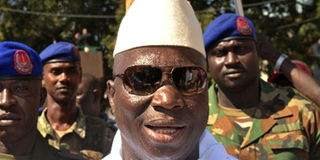Opposition urges Gambia to commute death sentences

Gambian president Yahya Jammeh. President Jammeh announced Friday that he was imposing a moratorium on executions. Photo/FILE
The Gambian opposition called on the president on Sunday do to more than suspend the executions of prisoners on death row, urging him to commute their sentences to life in jail.
President Yahya Jammeh announced Friday that he was imposing a moratorium on executions, after coming under intense criticism for resuming capital punishment with the execution by firing squad of nine convicts last month.
"His decision to put a halt to the executions... was as a result of serious international pressure and it was right that the government has responded in a mature way to the outcry," main opposition leader Ousainou Darboe told AFP.
"I think he should go further than this and commute the sentences of all those on death row to life imprisonment," said Darboe, the leader of the United Democratic Party who was defeated by Jammeh in an election last year.
Jammeh's move came after a first group of nine convicts were executed by firing squad on August 29 following his announcement 10 days earlier that the country planned to execute all death-row prisoners by mid-September.
"It is hereby made clear that it is only a moratorium on executions and what happens next will be dictated by either a declining violent crime rate in which case the moratorium will be indefinite or an increase in the violent crime rate in which case the moratorium will be lifted automatically,"
His office said international pressure had played a part in the decision to suspend executions, including from Ivory Coast, Mauritania and Senegal -- which surrounds Gambia except for a strip of Atlantic coastline.
Two Senegalese were among the nine executed prisoners.
Rights groups estimate another 38 convicts face the firing squad in the small west African country where Jammeh, who seized power in a 1994 coup, rules with an iron fist and brooks no criticism.
The president, who claims he can cure AIDS and other illnesses, is often accused of rights abuses and muzzling journalists.
Amnesty International has condemned Gambia's increasing use of the death penalty over the past few years, claiming that some were sentenced for crimes of a political nature and suffered torture and harsh treatment to extract "confessions".
Darboe also said all those sentenced to death for treason should be pardoned, saying: "The convictions of some of these people were politically motivated."
Among the political prisoners are a former army chief, an ex-intelligence chief as well as a former deputy police chief, and businessmen and soldiers.




